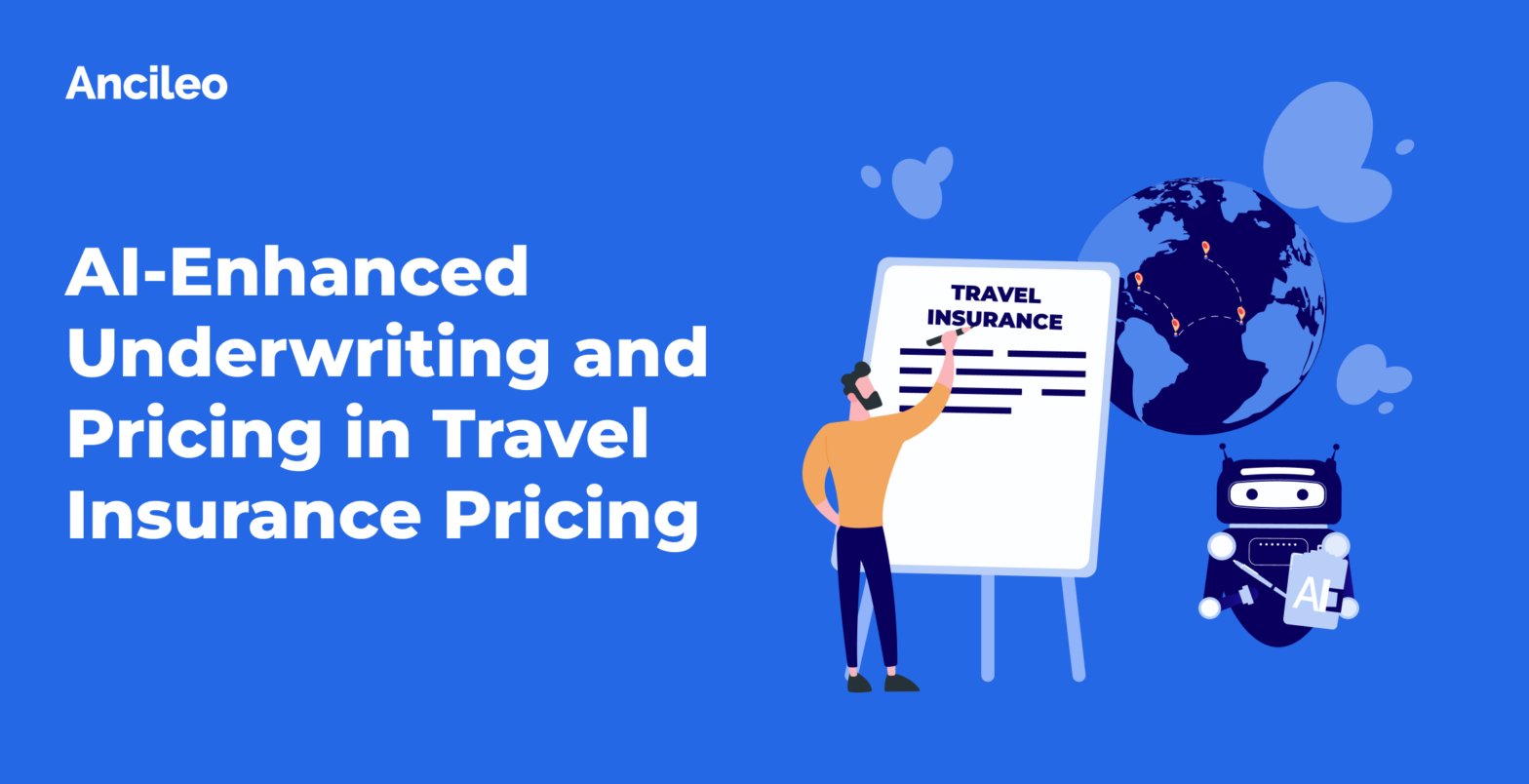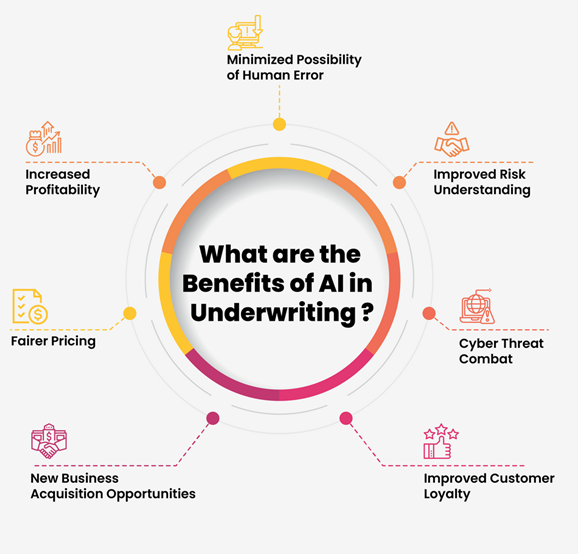
In the ever-evolving realm of insurance, technology continues to unveil innovative solutions that transform traditional methodologies into modern and advanced operations. Prominently, the impact of Artificial Intelligence (AI) has rewritten the norms in many sectors, including travel insurance. Forbes reported that 51% of businesses leverage the potential of AI for automation.
Fundamentally redefining the underwriting and pricing process in the travel insurance industry, AI brings an era of precision, efficiency, and competitive advantage that has never been experienced before. The global AI in insurance market size is projected to reach $45.74 billion by 2031, growing at a CAGR of 32.56% from 2022 to 2031.
Undermining the importance, we will discuss how AI technology is revolutionizing underwriting and pricing in travel insurance by ameliorating risk assessment accuracy and operational effectiveness for insurers. Furthermore, we’ll focus on how AI paves the way for more competitive and dynamic B2B pricing approaches, opening new profit avenues and refining the overall pricing strategy.
What does all this mean for travel insurance companies and travelers? For insurers, AI-enhanced underwriting could mean more accurate pricing, improved risk management, and efficiency improvements that can lead to drastic cost reductions. Insurers could also use AI to provide more personalized insurance products based on individual risk factors and preferences.
For travelers, AI-driven underwriting and pricing means faster insurance policy approvals, lower prices due to more accurate risk assessment, and more personalized insurance products. It could improve the overall customer experience, making buying travel insurance more streamlined and customer-centric.

Source: Marutitech (Nov, 23) AI in Insurance Underwriting
Human expertise is fundamental in the traditional process of underwriting and pricing travel insurance plans. Seasoned underwriters employ a comprehensive knowledge of risk and claim histories and a deep understanding of the travel industry’s intricacies to evaluate policy applicants’ risk levels and determine insurance pricing accordingly. Depending on the underwriter’s subjective judgment, this process can be slow, laborious, and sometimes subjective.
Now, let’s contrast this with AI underwriting. Artificial intelligence, machine learning, and advanced data analytics are set to prove to be game-changers in how travel insurance is underwritten and priced. An AI system can analyze, categorize, and score risks with remarkable speed and consistency using vast amounts of structured and unstructured data from various sources.
How exactly does AI enhance the underwriting and pricing process? One of the vital benefits of AI is its ability to utilize large and diverse data sets. These data sets can include an individual’s travel histories, travel destination specifics like weather patterns, political stability, disease outbreak statistics, and risk assessments related to the insurance company from multiple sources. Using machine learning algorithms, AI can analyze these vast data sets, spotting trends and making predictions, which are then utilized to make precise risk assessments.
Moreover, unlike human underwriters, AI systems can operate 24/7, processing real-time applications. It dramatically reduces the time to approve and price insurance plans, a significant advantage for travelers who often require quick insurance policy approvals.
Here are some uses of AI in the travel insurance industry. We have done an AI in insurance case study to give you insights from insurance AI companies.
Allianz, a global leader in insurance, has made substantial investments in Information Technology (IT), with a noteworthy part to AI technologies out of a total of $5.7 billion invested in 2022. The insurance giant has strategically integrated AI into its operations, particularly underwriting and pricing for travel insurance, resulting in a customer-centric approach. AI algorithms personalize products and services, aligning them with customer needs to provide tailored recommendations.
The company has applied AI underwriting insurance and pricing, facilitating rapid and precise calculations. AI has also been deeply embedded in claims handling, enhancing speed and effectiveness to improve customer satisfaction and retention. This deliberate incorporation of AI in insurance claims reflects Allianz’s commitment to providing efficient, personalized customer service.
Additionally, the company has instituted a Data Advisory Board (DAB) to guide data ethics decisions and issued the Allianz Practical Guidance for AI, promoting responsible AI usage across major European entities through targeted workshops and training. The tangible results include a 15% year-over-year revenue growth, a substantial reduction in operational costs (30-50%), and a noteworthy increase in customer satisfaction ratings.
Chubb, under the leadership of CEO Evan Greenberg, is strategically incorporating artificial intelligence (AI) into various aspects of its operations, including underwriting, claims, marketing, analytics, customer interface, and customer service. The application of AI in pricing and underwriting is particularly noteworthy as Chubb seeks to optimize these critical functions. By leveraging AI tools, the insurer aims to refine its risk assessment processes, allowing for more accurate pricing models and improved underwriting decisions.
Moreover, Chubb’s commitment to the integration of AI extends beyond experimentation. The insurer is preparing to scale up the implementation of AI tools, signaling a strategic move towards widespread utilization of this technology. As Chubb continues to iterate and fine-tune its AI applications, it aims to usher in a new era where these tools are employed at scale, contributing to the company’s growth and digital transformation initiatives in the competitive insurance landscape.
Markel is a specialty insurance provider helping you meet your insurance coverage needs. The success story of Markel and Cytora’s partnership is a compelling illustration of the transformative power of artificial intelligence (AI) in the underwriting of travel insurance. Before the collaboration, Markel faced challenges with underwriters spending a substantial amount of time on low-value tasks, leading to a less efficient and slower underwriting process.
By leveraging Cytora’s AI-driven technology, Markel was able to revolutionize its approach, automating pre-underwriting activities and streamlining risk evaluation processes. It resulted in a remarkable 113% increase in productivity for Markel’s underwriting team and significantly reduced the average quote turnaround time from one day to just two hours. Implementing AI saved time and allowed underwriters to focus on high-value tasks, providing decision-ready risks within minutes and ultimately enhancing the overall efficiency and service quality for travel insurance underwriting.
Hiscox, a UK insurer, has partnered with Google to pioneer an artificial intelligence model that automates underwriting for specialist risks and is considered a first in London’s insurance market. In a trial phase, the technology was used to automate the underwriting, where Hiscox was the lead underwriter. The innovation streamlines the quoting process, and allows underwriters to focus on more complex risks. And enhances their ability to engage in sales-related activities.
The model developed by Hiscox and Google utilizes Google’s generative AI combined with Hiscox’s digital technology to process data from insurance brokers’ email submissions. The AI system is designed to analyze the draft contract. Assess whether the risk aligns with Hiscox’s criteria, and even draft a response to the broker. Which a human underwriter reviews before dispatch. This milestone in AI adoption marks a significant departure from the traditional person-to-person negotiation of specialist commercial insurance contracts.
While the advantages of AI-enhanced underwriting are apparent, the system has challenges. Here are some challenges for AI in the travel insurance industry.
Data quality and accuracy are paramount in AI-enhanced underwriting, as the system relies on precise information for informed decision-making. Garbage in, garbage out—this adage holds particularly true for artificial intelligence in insurance. If the data fed into the system is flawed or outdated, it can compromise the entire underwriting process. Resulting in unreliable risk assessments.
Furthermore, inaccurate data inputs can skew insurance pricing, leading to premiums. That may not accurately reflect the actual risk associated with a policy. Establishing robust data validation processes. Ensuring a continuous flow of accurate information is crucial for the success and reliability of AI-driven underwriting systems.
AI in the insurance industry faces challenges related to regulatory and privacy issues. Adhering to comprehensive data governance. And regulatory compliance frameworks is crucial to ensure the appropriate use of AI in underwriting and pricing insurance plans.
Striking the right balance between harnessing the power of AI for improved efficiency and respecting data protection regulations is paramount. Proactive measures such as robust encryption protocols and transparent communication with regulatory bodies are essential in addressing this. These challenges foster trust in adopting AI within the insurance industry.
One of the significant challenges in implementing AI for travel insurance is integrating these advanced technologies with existing legacy systems. Many traditional insurance companies operate on legacy platforms that were not designed to accommodate the complexities of AI. As a result, organizations face the daunting task of bridging the gap between outdated infrastructure. And the sophisticated requirements of AI applications.
Integrating AI with legacy systems often involves extensive modifications to the existing architecture. Legacy systems might use outdated programming languages or lack APIs (Application Programming Interfaces) needed for smooth communication with AI components. Furthermore, companies need to ensure that integrated AI solutions enhance operational efficiency. And do not disrupt the core functions of their legacy systems. Making a phased approach to integration a common strategy for mitigating risks.
With ongoing advancements in AI technology and its wider adoption within the AI insurance industry. We can expect improvements in the precision of risk assessments and streamlined processes for underwriting and pricing travel insurance. This evolution is poised to benefit consumers and insurance companies, fostering a more competitive and responsive market.
As AI refines its ability to analyze vast datasets and identify nuanced patterns. It promises to tailor insurance plans to individual needs. Making coverage more personalized and cost-effective for travelers. Moreover, the proactive risk management facilitated by AI can contribute to a more resilient insurance ecosystem. Ensuring that companies are better equipped to navigate uncertainties and deliver reliable coverage to policyholders.